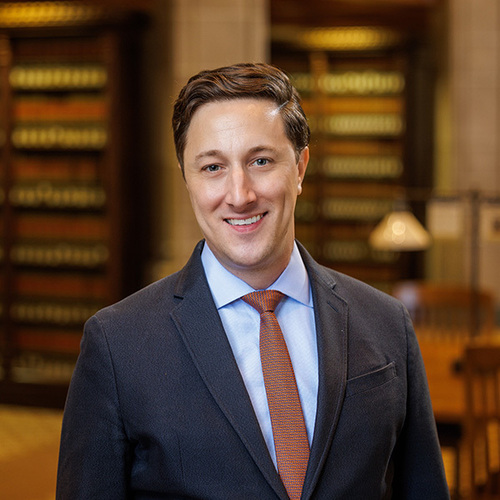Derek T. Muller

Professor of Law
Email: dmuller@nd.edu
CV: View
SSRN: View
Professor Derek Muller is a nationally-recognized scholar in the field of election law. His research focuses on the role of states in the administration of federal elections, the constitutional contours of voting rights and election administration, the limits of judicial power in the domain of elections, and the Electoral College.
He has published more than two dozen academic works, and his op-eds have appeared in the New York Times, the Los Angeles Times, and the Wall Street Journal. He has testified before Congress, and he is a contributor at the Election Law Blog. He is a co-author on a Federal Courts casebook published by Carolina Academic Press. He is also the co-reporter on a new Restatement of the Law, Election Litigation, an effort led by the American Law Institute.
Professor Muller graduated Notre Dame Law School summa cum laude in 2007. He teaches Election Law, Civil Procedure, and Evidence.
Courses Taught
- Civil Procedure
- Evidence
- Election Law
Scholarship
Principal Publications
Election Subversion and the Writ of Mandamus, 65 WILLIAM & MARY L. REV. 327 __ (2023)
The Electoral Count Reform Act and the Original Public Meaning of the Twelfth Amendment, CASE WESTERN RES. L. REV. (forthcoming)
The Secret Sauce: Examining Law Schools That Overperform on the Bar Exam, 75 FLA. L. REV. 65 (2023) (with Christopher J. Ryan)
Faith in Elections, 36 NOTRE DAME J. L. ETHICS & PUB. POL’Y 641 (2022)
Twenty-Third Amendment Problems Confronting District of Columbia Statehood, 2021 HARV. J.L. & PUB. POL’Y PER CURIAM 11 (2021)
Reducing Election Litigation, 90 FORDHAM L. REV. 561 (2021)
Brnovich v. DNC: Election Litigation Migrates from Federal Courts to the Political Process, 2020– 2021 CATO SUP. CT. REV. 217
Electoral Votes Regularly Given, 55 GA. L. REV. 1529 (2021)
Weaponizing the Ballot, 48 FLA. ST. U. L. REV. 61 (2021)
The Electoral College and the Federal Popular Vote, 15 HARV. L. & POL’Y REV. 129 (2020)
Chameleon Congressional Districts, 64 ST. LOUIS U. L.J. 673 (2020)
Nonjudicial Solutions to Partisan Gerrymandering, 62 HOWARD U. L.J. 791 (2019)
The High Cost of Lowering the Bar, 32 GEO. J. L. ETHICS 307 (2019) (with Robert Anderson IV)
The Democracy Ratchet, 94 IND. L.J. 451 (2019)
Legal Quandaries in the Alabama Senate Election of 2017, 69 ALA. L. REV. 983 (2018)
What’s Old Is New Again: The Nineteenth Century Voter Registration Debates and Lessons About Voter Identification Disputes, 56 WASHBURN L.J. 109 (2017)
“Natural Born” Disputes in the 2016 Presidential Election, 85 FORDHAM L. REV. 1097 (2016)
Ballot Speech, 58 ARIZ. L. REV. 693 (2016)
Legislative Delegations and the Elections Clause, 43 FLA. ST. U. L. REV. 717 (2016)
Perpetuating “One Person, One Vote” Errors, 39 HARV. J.L. & PUB. POL’Y 371 (2016)
Scrutinizing Federal Electoral Qualifications, 90 IND. L.J. 559 (2015)
The Play in the Joints of the Election Clauses, 13 ELECTION L.J. 310 (2014)
Judicial Review of Congressional Power Before and After Shelby County v. Holder, 8 CHARLESTON L. REV. 287 (2013)
Invisible Federalism and the Electoral College, 44 ARIZ. ST. L.J. 1237 (2012)
More Thoughts on the Compact Clause and the National Popular Vote: A Response to Professor Hendricks, 7 ELECTION L.J. 227 (2008)
The Compact Clause and the National Popular Vote Interstate Compact, 6 ELECTION L.J. 372 (2007)
Casebook
ARTHUR D. HELLMAN, DAVID R. STRAS, RYAN W. SCOTT, F. ANDREW HESSICK, & DEREK T. MULLER, FEDERAL COURTS: CASES AND MATERIALS ON JUDICIAL FEDERALISM AND THE LAWYERING PROCESS (Carolina Academic Press, 5th ed. 2022)
Book Chapters
“Elector Qualifications Clause,” “Qualifications for Representatives Clause,” “The Elections Clause,” “Judge of Elections Clause,” “Presidential Electors Clause,” “Twenty-Third Amendment,” and “Twenty-Fourth Amendment,” THE HERITAGE GUIDE TO THE CONSTITUTION (3d ed.) (forthcoming)
“Ballot Access,” in THE OXFORD HANDBOOK OF AMERICAN ELECTION LAW (Eugene D. Mazo ed., Oxford University Press) (2023)
“Simplifying Presidential Elections,” in THE BEST CANDIDATE: PRESIDENTIAL NOMINATION IN POLARIZED TIMES (Eugene D. Mazo & Michael R. Dimino eds., Cambridge University Press 2020)
Essays, Responses, & Notes
A Bully Pulpit Approach to Elections in the Early Biden Administration, 2021 U. ILL. L. REV. ONLINE: Biden 100 Days 166 (Apr. 30, 2021)
Governing Elections Without Law, 100 B.U. L. REV. ONLINE 278 (2020)
Restraining Judicial Application of the “Safe Harbor” Provision in the Electoral Count Act, 81 OHIO ST. L.J. ONLINE 221 (2020)
Celebrating the Work of Professor Bob Cochran: An Introduction, 47 PEPP. L. REV. iii (2020)
Cyber Interference in Elections and Federal Agency Action, HARV. L. REV. BLOG (Oct. 29, 2018)
Three Divergent Election-Law Decisions in the Early Trump Administration, 2017 U. ILL. L. REV. ONLINE: Trump 100 Days (Apr. 29, 2017)
Complexity Confronting State Judges and the Right to Vote, 77 OHIO ST. L.J. FURTHERMORE 65 (2016)
Evenwel v. Abbott: A New Attempt to Define “One Person, One Vote,” GEO. WASH. L. REV. DOCKET (Apr. 5, 2016)
“Compact Clause,” 1 AMERICAN GOVERNANCE 355 (S. Schechter et al. eds., Macmillan 2016)
Disfavored Candidates and the Democracy Canon, 65 FLA. L. REV. FORUM 53 (2013)
Note, “As Much Upon Tradition as Upon Principle”: A Critique of the Privilege of Necessity Destruction Under the Fifth Amendment, 82 NOTRE DAME L. REV. 481 (2006)
Testimony
U.S. Senate Committee on Rules and Administration, “The Electoral Count Act: The Need for Reform,” Aug. 3, 2022
U.S. Senate Committee on Homeland Security & Governmental Affairs, “Examining D.C. Statehood,” June 22, 2021
Areas of Expertise
- Election Law
- Federal Courts
- Legal Education
- Civil Procedure